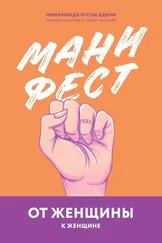Чимаманда Адичи - Purple hibiscus
Здесь есть возможность читать онлайн «Чимаманда Адичи - Purple hibiscus» — ознакомительный отрывок электронной книги совершенно бесплатно, а после прочтения отрывка купить полную версию. В некоторых случаях можно слушать аудио, скачать через торрент в формате fb2 и присутствует краткое содержание. Год выпуска: 2003, ISBN: 2003, Издательство: Algonquin Books of Chapel Hill, Жанр: Современная проза, на английском языке. Описание произведения, (предисловие) а так же отзывы посетителей доступны на портале библиотеки ЛибКат.
- Название:Purple hibiscus
- Автор:
- Издательство:Algonquin Books of Chapel Hill
- Жанр:
- Год:2003
- ISBN:1-56512-387-5
- Рейтинг книги:5 / 5. Голосов: 1
-
Избранное:Добавить в избранное
- Отзывы:
-
Ваша оценка:
- 100
- 1
- 2
- 3
- 4
- 5
Purple hibiscus: краткое содержание, описание и аннотация
Предлагаем к чтению аннотацию, описание, краткое содержание или предисловие (зависит от того, что написал сам автор книги «Purple hibiscus»). Если вы не нашли необходимую информацию о книге — напишите в комментариях, мы постараемся отыскать её.
Purple hibiscus — читать онлайн ознакомительный отрывок
Ниже представлен текст книги, разбитый по страницам. Система сохранения места последней прочитанной страницы, позволяет с удобством читать онлайн бесплатно книгу «Purple hibiscus», без необходимости каждый раз заново искать на чём Вы остановились. Поставьте закладку, и сможете в любой момент перейти на страницу, на которой закончили чтение.
Интервал:
Закладка:
"I don't like to send you to the home of a heathen, but Goc will protect you," Papa said. He put the Bible in a drawer and then pulled Jaja and me to his side, gently rubbed the sides of our arms.
"Yes, Papa."
He went into the large living room. I could hear more voices, more people coming in to say "Nno nu" and complain about how hard life was, how they could not buy new clothes for their children this Christmas.
"You and Jaja can have breakfast upstairs. I will bring the things up. Your father will eat with the guests," Mama said.
"Let me help you," I offered.
"No, nne, go upstairs. Stay with your brother."
I watched Mama walk toward the kitchen, in her limping gait. Her braided hair was piled into a net that tapered to a golf-ball-like lump at the end, like a Father Christmas hat. She looked tired.
"Papa-Nnukwu lives close by, we can walk there in five minutes, we don't need Kevin to take us," Jaja said, as we went back upstairs. He said that every year, but we always climbed into the car so that Kevin could take us, so that he could watch us.
As Kevin drove us out of the compound later that morning, I turned to allow my eyes to stroke, once again, the gleaming white walls and pillars of our house, the perfect silver-colored water arch the fountain made. Papa-Nnukwu had never set foot in it, because when Papa had decreed that heathens were not allowed in his compound, he had not made an exception for his father.
"Your father said you are to stay fifteen minutes," Kevin said, as he parked on the roadside, near Papa-Nnukwu's thatch enclosed compound.
I stared at the scar on Kevin's neck before I got out of the car. He had fallen from a palm tree in his hometown in the Niger Delta area, a few years ago while on vacation. The scar ran from the center of his head to the nape of his neck. It was shaped like a dagger.
"We know," Jaja said. Jaja swung open Papa-Nnukwu's creaking wooden gate, which was so narrow that Papa might have to enter sideways if he ever were to visit. The compound was barely a quarter of the size of our backyard in Enugu. Two goats and a few chickens sauntered around, nibbling and pecking at drying stems of grass. The house that stood in the middle of the compound was small, compact like dice, and it was hard to imagine Papa and Aunty Ifeoma growing up here. It looked just like the pictures of houses I used to draw in kindergarten: a square house with a square door at the center and two square windows on each side. The only difference was that Papa-Nnukwu's house had a verandah, which was bounded by rusty metal bars. The first time Jaja and I visited, I had walked in looking for the bathroom, and Papa-Nnukwu had laughed and pointed at the outhouse, a closet-size building of unpainted cement blocks with a mat of entwined palm fronds pulled across the gaping entrance. I had examined him that day, too, looking away when his eyes met mine, for signs of difference, of Godlessness. I didn't see any, but I was sure they were there somewhere. They had to be.
Papa-Nnukwu was sitting on a low stool on the verandahj bowls of food on a raffia mat before him. He rose as we came in. A wrapper was slung across his body and tied behind his neck, over a once white singlet now browned by age and yeU lowed at the armpits. "Neke! Neke! Neke! Kambili and Jaja have come to greet their old father!" he said. Although he was stooped with age, it was easy to see how tall he once had been. He shook Jaja'S hand and hugged me. I pressed myself to him just a moment longer, gently, holding my breath because of the strong, unpleasant smell of cassava that clung to him.
"Come and eat," he said, gesturing to the raffia mat. The enamel bowls contained flaky fufu and watery soup bereft of chunks of fish or meat. It was custom to ask, but Papa Nnukwu expected us to say no-his eyes twinkled with mischief.
"No, thank sir," we said. We sat on the wooden bench next to him. I leaned back and rested my head on the wooden window shutters, which had parallel openings running across them.
"I hear that you came in yesterday," he said. His lower lip quivered, as did his voice, and sometimes I understood him a moment or two after he spoke because his dialect was ancient; his speech had none of the anglicized inflections that ours had.
"Yes," Jaja said.
"Kambili, you are so grown up now, a ripe agbogho. Soon the suitors will start to come," he said, teasing. His left eye was going blind and was covered by a film the color and consistency of diluted milk. I smiled as he stretched out to pat my shoulder; the age spots that dotted his hand stood out because they were so much lighter than his soil-colored complexion.
"Papa-Nnukwu, are you well? How is your body?" Jaja asked.
Papa-Nnukwu shrugged as if to say there was a lot that was wrong but he had no choice. "I am well, my son. What can an old man do but be well until he joins his ancestors?" He paused to mold a lump of fufu with his fingers. I watched him, the smile on his face, the easy way he threw the molded morsel out toward the garden, where parched herbs swayed in the light breeze, asking Ani, the god of the land, to eat with him. "My legs ache often. Your Aunty Ifeoma brings me medicine when she can put the money together. But I am an old man; if it is not my legs that ache, it will be my hands."
"Will Aunty Ifeoma and her children come back this year?" I asked.
Papa-Nnukwu scratched at the stubborn white tufts that clung to his bald head. "Ehye, I expect them tomorrow."
"They did not come last year," Jaja said. "Ifeoma could not afford it."
Papa-Nnukwu shook his head. "Since the father of her children died, she has seen hard times. But she will bring them this year. You will see them. It is not right that you don't know them well, your cousins. It is not right."
Jaja and I said nothing. We did not know Aunty Ifeoma or her children very well because she and Papa had quarreled about Papa-Nnukwu. Mama had told us. Aunty Ifeoma stopped speaking to Papa after he barred Papa-Nnukwu from coming to his house, and a few years passed before they finally started speaking to each other.
"If I had meat in my soup," Papa Nnukwu said, "I would offer it to you."
"It's all right, Papa-Nnukwu," Jaja said.
Papa-Nnukwu took his time swallowing his food. I watched the food slide down his throat, struggling to get past his sagging Adam's apple, which pushed out of his neck like a wrinkled nut. There was no drink beside him, not even water.
"That child that helps me, Chinyelu, will come in soon. I will send her to go and buy soft drinks for you two, from Ichie's shop," he said.
"No, Papa-Nnukwu. Thank sir," Jaja said.
"Ezi okwu? I know your father will not let you eat here because I offer my food to our ancestors, but soft drinks also? Do I not buy that from the store as everyone else does?"
"Papa-Nnukwu, we just ate before we came here," Jaja said. "If we're thirsty, we will drink in your house."
Papa-Nnukwu smiled. His teeth were yellowed and widely spaced because of the many he had lost. "You have spoken well, my son. You are my father, Ogbuefi Olioke, come back. He spoke with wisdom."
I stared at the fufu on the enamel plate, which was chipped of its leaf-green color at the edges. I imagined the fufu, dried to crusts by the harmattan winds, scratching the inside of Papa-Nnukwu's throat as he swallowed.
Jaja nudged me. But I did not want to leave; I wanted to stay so that if the fufu clung to Papa-Nnukwu's throat and choked him, I could run and get him water. I did not know where the water was, though.
Jaja nudged me again and I still could not get up. The bench held me back, sucked me in. I watched a gray rooster walk into the shrine at the corner of the yard, where Papa-Nnukwu's god was, where Papa said Jaja and I were never to go near. The shrine was a low, open shed, its mud roof and walls covered with dried palm fronds. It looked like the grotto behind St. Agnes, the one dedicated to Our Lady of Lourdes.
Читать дальшеИнтервал:
Закладка:
Похожие книги на «Purple hibiscus»
Представляем Вашему вниманию похожие книги на «Purple hibiscus» списком для выбора. Мы отобрали схожую по названию и смыслу литературу в надежде предоставить читателям больше вариантов отыскать новые, интересные, ещё непрочитанные произведения.
Обсуждение, отзывы о книге «Purple hibiscus» и просто собственные мнения читателей. Оставьте ваши комментарии, напишите, что Вы думаете о произведении, его смысле или главных героях. Укажите что конкретно понравилось, а что нет, и почему Вы так считаете.
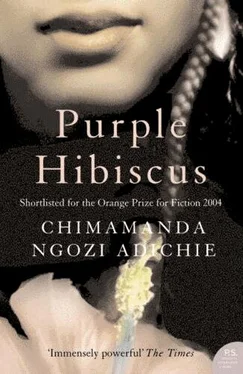
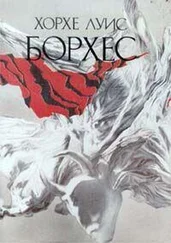
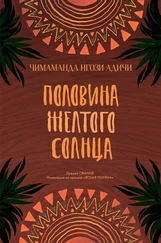
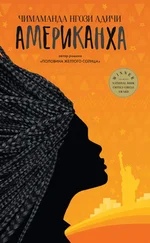
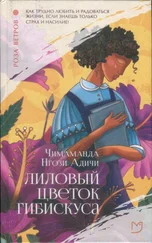
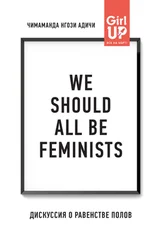
![О Генри - Пурпурное платье [The Purple Dress]](/books/405339/o-genri-purpurnoe-plate-the-purple-dress-thumb.webp)
